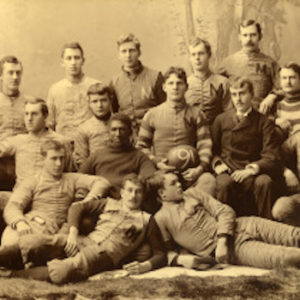
U. of Mich. (1890) George Jewett (center)
American College football is in the air, and Black involvement at the collegiate level is rich with historical tradition.
It is a fact that historically, Black colleges and universities (HBCUs) have been the essence of Black college football for many years. Black football players were not welcome on white campuses until the late 1950s and 1960s in the Deep South, although there were a few exceptions to this 'Whites Only' rule. William Henry Lewis and William Tecumseh played and excelled at Amherst and Harvard in late 1889. Also, George Jewett was the starting fullback at the University of Michigan in 1890.
The first Black college football game occurred in North Carolina in 1892 when Biddle College defeated Livingston College. By the turn of the last century, several major school rivalries had developed, including Virginia Union v. Virginia State, Tuskegee v. Talladega, and Fisk v. Meharry. In the 1920s, Tuskegee had the most dominant Black college program. In the 1930s, Morgan State was the nation's premier Black college football power. Racism continued segregating Black players from whites in America throughout the 1940s and 1950s. Several Black players managed to continue breaking racial barriers. Willie Thrower (Michigan State University) was the first Black quarterback in the Big Ten Conference.
In 1955, Cal Jones of the University of Iowa became the first Black to win the Outland Trophy, an award recognizing the best lineman in the nation. The following year, Jim Parker of Ohio State won. By 1960, some of the most racist southern universities found themselves on the losing side of battles with integrated teams. Since 1970, Blacks have won most of the annual Heisman Trophies and several of the most recent Outland Trophies.
In 1979, Willie Jeffries became the first Black head coach at a predominantly white school in Wichita State. This was followed by Dennis Green, who led Northwestern from 1981 to 1985. More black coaches are being hired for major college positions, although there are still qualified coaches who aren't considered due to the institution's continuing color barrier. In 2003, when Notre Dame's Tyrone Willingham and Michigan State's Bobby Williams shook hands on a football field in East Lansing, Mich., it was a rare moment: At the time, the two of them, old friends, represented one-half of the African American head coaches among the 117 major college programs in America.
Most of the country's top programs have predominantly Black football teams. A check of Division I-A coaching staffs reveals little significant change soon among prominent college head coaches. More than 43% of players at that level are Black, but in 2020, at college football's top level, there are 13 African American head coaches at FBS schools, down from 15 two years ago and roughly in line with the NFL's puny numbers (three out of 32).
The minority numbers are higher on the defensive side but still show an appalling lack of diversity. There are 16 African American coordinators, with another six Black coaches listed as co-coordinators (including job-sharing between two coaches of color at Arizona State and Charlotte).
Rice is the only FBS school that has Blacks in both coordinator spots. Jerry Mack is in charge of the offense, and Brian Smith runs the defense for head coach Mike Bloomgren, who is white. The Pac-12 has the most head-coaching diversity of any conference, with African Americans holding five of 12 positions. There are three Black head coaches in the 14-team Big Ten, including Illinois' Lovie Smith. Beyond that, the Power Five jobs are almost entirely white. There is one head coach of color in the 14-team SEC (Vanderbilt's Derek Mason), one in the 14-team ACC (Syracuse's Dino Babers), and none in the 10-school Big 12.
In 2019, Kevin Warren was introduced as the incoming commissioner of the Big Ten Conference, the first African American to hold that position at what is now known as a "Power 5" conference. Deion Sanders was hired by the University of Colorado in 2023.
There were only 25 Black head coaches (4.7%), 18 Latin head coaches (3.2%), and 6 Asian head coaches (1.14%). Even more concerning was the number of minorities in athletic director positions. Of the 326 athletic director positions in Division I, only 20 were Black. These numbers were disturbing and contradicted the association's mission: "The NCAA believes in diversity, inclusion, and gender equality with all personnel working within the NCAA organization.
Black College Football HOF.org
The Negro in Sports,
By Edwin Bancroft Henderson,
The Associated Publishers Inc (Washington DC),
CopyRight 1939
(Early History including Fritz Pollard)
The National Collegiate Athletic Association
700 W. Washington Street
P.O. Box 6222
Indianapolis, Indiana 46206-6222